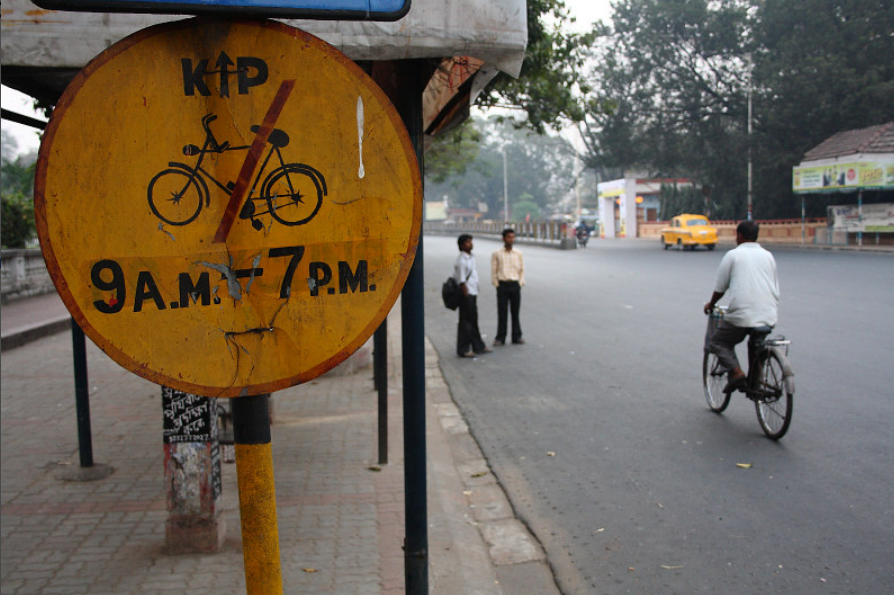Crisis and Recovery: Cycling in Kolkata City

Cycling is thriving, both as a mode of transport and as a way of staying healthy during the COVID-19 crisis. Local government’s response has varied across the globe, some lowering speed limits, some building pop-up bike lanes and others subsidizing e-bike purchases. While some are reimbursing bike repairs along with creation of cycle parking. In India, in addition to palpable hesitation towards use of public transport during the pandemic, the general paucity of mobility options, has led to a gradual shift to cycling. Chennai, Bengaluru, Delhi, Mumbai, Kochi, and Kolkata are among the few cities witnessing this shift. The sudden increase in cycling is visibly apparent in Kolkata, where cyclists are seen on the roads now more than ever. According to an estimate by the traffic and transportation planning directorate, 15 lakh people had been out on Kolkata’s roads on cycles between June 1-15 and the number has been increasing ever since. Looking at the momentum gained around cycling, Ministry of Housing and Urban Affairs (MoHUA) also launched Cycle4Change challenge on July 10, to harness this opportunity.
This year on World Bicycle Day on June 3, a group of bicycle enthusiasts, Kolkata Cycle Samaj, urged the West Bengal Chief Minister Mamata Banerjee to promote cycling in Kolkata. It was on the same day that the CM posted her first tweet about cycling under the Sabooj Sathi scheme. On June 8, the CM office issued a press release, asking Kolkata Police to allow bicycles on some streets. A Traffic Regulations notification was then released allowing bicycles on some of the previously banned streets.
New battles for road space
Kolkata’s battle for road space has been more than a decade old. In 2008, traffic regulations classified bicycles as slow-moving transport, thus prohibiting them on 38 major roads. In 2013, this ban was extended to 174 roads. While amended traffic regulations re-opened 112 roads to cyclists the same year, the 62 roads where ban remained included roads on which cyclists relied greatly for work trips.
According to 2011 Census, cycling to work is prevalent in Kolkata, being the third preferred choice of commute to work (10% of the trips), after walking (39%) and public transport (31%). Most riders are livelihood-based cyclists, like street vendors, factory workers, daily wage earners. Also, due to the concentration of major commercial and industrial units in the northern and central parts, the city witnesses high percentage of workers from suburban areas, majority of whom rely on cycling and public transport. The city has witnessed numerous cases of penalization for wrongful parking or entering no cycling zones, where half the cases involve cyclists from working class.
During the lockdown, in absence of public transport and despite such restrictions, a considerable part of Kolkata’s working-class population cycled to work. Bicycle stores on Bentinck Street that survived decades of declining sales witnessed record business in the first 15 days of unlocking in June 2020. This caught media attention and the changing scenario was brought to everyone’s attention. The city administration was then pressured to amend traffic regulations for these ‘new’ road users, who on any normal day, go unnoticed. A consulting agency was also appointed by city to conduct surveys for cycling infrastructure and to prepare city’s bicycle plan.
Cycling beyond mobility lifeline for people in Kolkata
Other than being a sustainable mode of transport, cycling also provides a critical lifeline to cities during crises, providing benefits that go beyond mobility, few of which are mentioned:
- An analysis of different sources of air pollution in Kolkata has revealed that motor vehicles are the leading contributor to air pollution (51.4%), followed by industry (24.5%) and dust particles (21.1%), respectively. Each kilometer cycled avoids 250 gm of Carbon Dioxide emission, making bicycles a key option for low-carbon transport. It offers a way to increase physical activity, which improves individual resilience.
- Cycling is immune to oil prices. Moreover, it is an indirect, non-verbal social interaction at the street level.
- Cycling can help cities become more resilient to future shocks: providing an option for navigating obstructed streets without contributing to vehicular chaos and also helpful in carrying medicines and other light supplies during natural disasters.
With Kolkata planning to take up measures to ensure safe cycling, it is a valuable opportunity to promote cycling taking the needs of existing cyclists into consideration. Kolkata, like many Indian cities, has a long-lasting tradition of livelihood cyclists. For them riding a cycle is not just a mobility option; it is a livelihood necessity. Cycling enthusiasts from the city also believe that Kolkata’s affirmative tendency to adopt to cultural changes and comparatively low social barriers, provide cycling a tremendous potential. There exists a unique relationship between cycling and the city and it will not be far-fetched to say that it is time to recycle the streets of Kolkata.
Santajib Gupta is the Bicycle Mayor of Kolkata and a bicycling enthusiast.
These are the authors' personal views.
